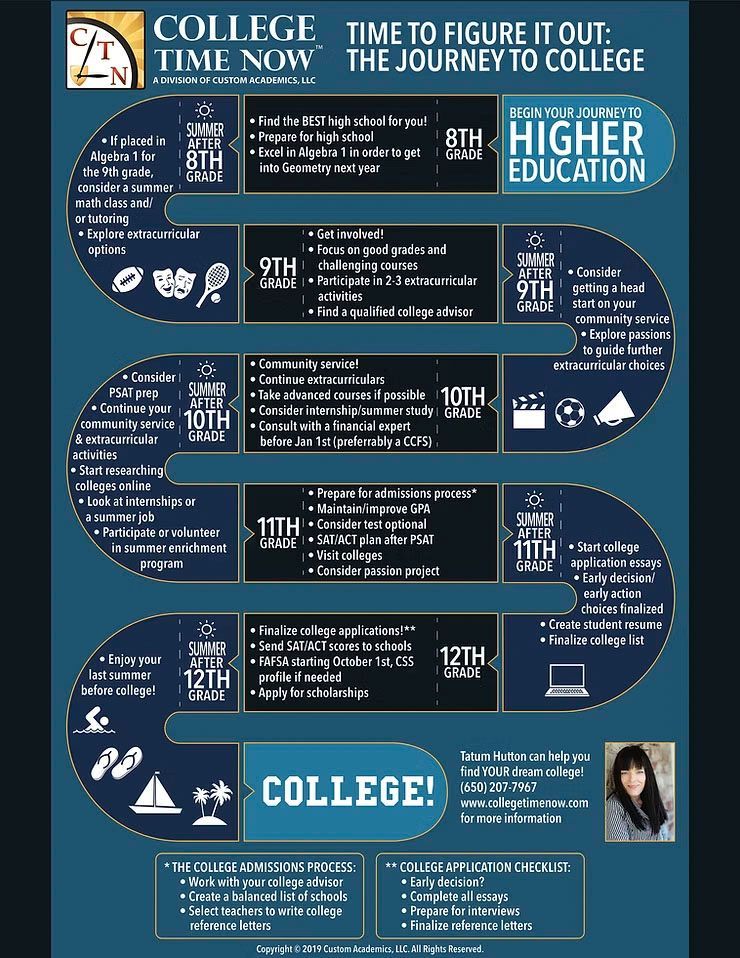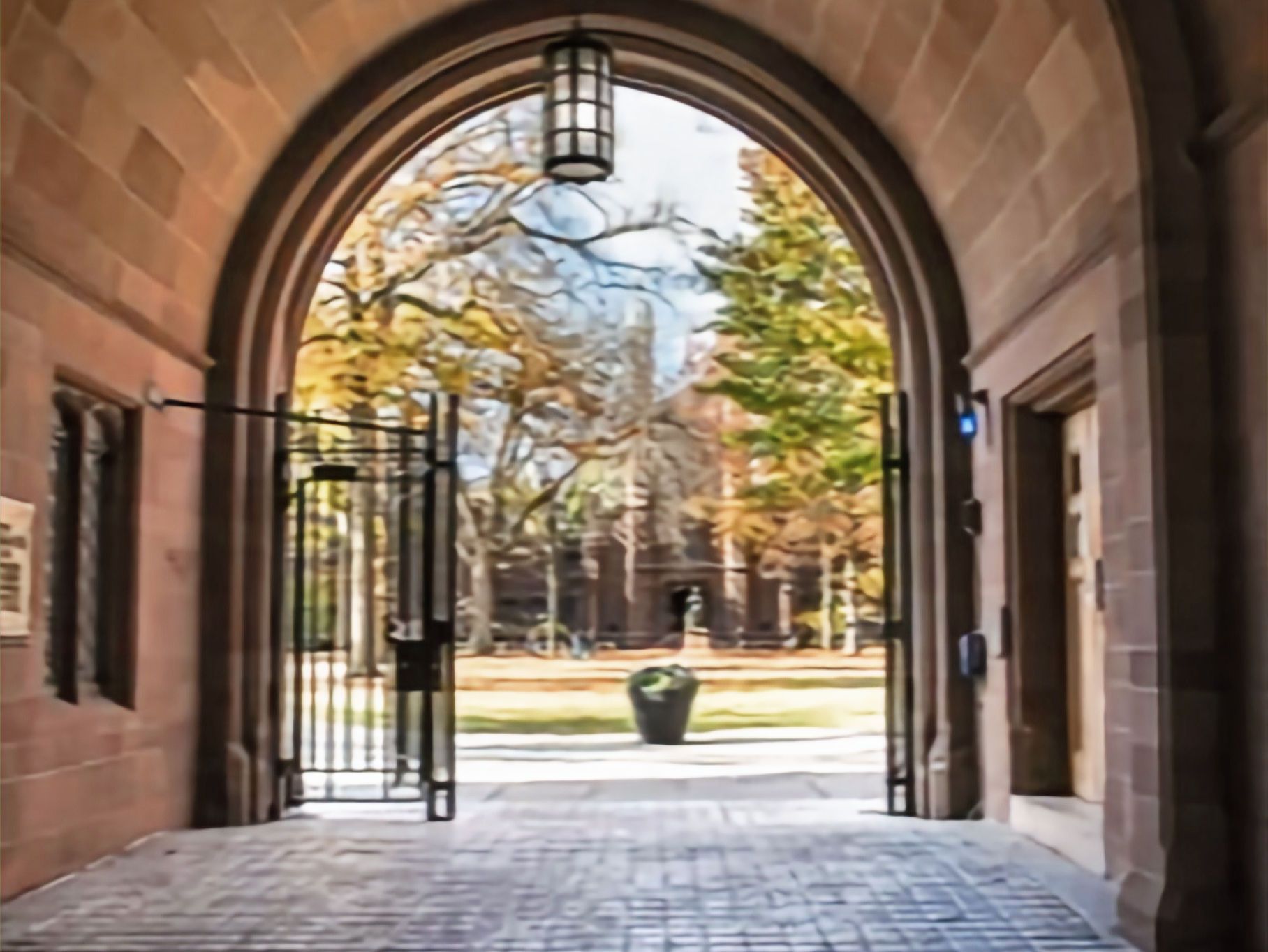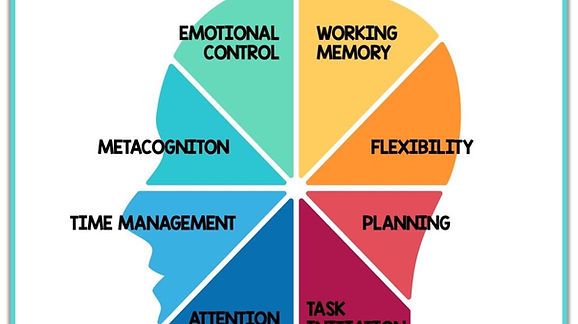The Question I Get Asked More Than Any Other
"What should my child be doing this year/summer/break/etc. to prepare for college?"
There are clearly differences based on the student's goals, skills, grades, motivation, and circumstances. However, there are some general guidelines you can follow to make sure that something big doesn't fall through the cracks.
As a high school student, it's important to start thinking about your future and preparing for college early on.
As a parent, it's important to listen, encourage, and push your child to try new things and follow their passions.
By taking the right steps each year, students can increase their chances of getting into their top choice colleges and setting themselves up for success in the future. Parents can make it easier.....or not.
Here's a breakdown of what high school students and parents should be doing each year to best prepare for college:
- sure to explain that in your applictions.
- Start researching colleges: Begin researching different colleges and universities to get an idea of what you're looking for in a school. Consider factors such as location, size, programs offered, and campus culture.
Junior year:
STUDENTS
- -Challenge yourself academically: Take challenging courses such as honors or AP classes, BUT too many will turn into a nightmare. It is not about quantity and it is NOT about your weighted GPA. Most students think that they will make up for lower GPAs by taking the maximum AP courses, because it gives them a higher "weighted" GPA. THIS IS NOT TRUE.
- Your weighted GPA is one of 7 (primary) ways of calculating your GPA- and the LEAST important to colleges. Some schools remove it as a variable altogether. All of them calculate and recalculate your GPA in multiple ways to compare their data. You can never hide a low GPA. The unweighted one and the CORE GPA are the most important ones, but course rigor also plays a huge role. If you take all easy courses and have a high GPA, that is less impressive than someone who takes advanced courses yet has a slightly lower GPA.
- Take a reasonable number of advanced courses in subjects you are passionate about to show colleges that you're capable of handling rigorous coursework. Your junior year grades are especially important when it comes to college applications. So taking APs and getting B's and B-'s over a reasonable courseload (for YOU- it's individual) is worse than taking a reasonable courseload and getting straight A's.
- Prepare for standardized tests: After your PSAT, make an informed decision if you should take the ACT or SAT (or apply only to test optional schools). If you decide to take the exam, make a test prep plan that is realistic and over the course of at least 4 months- and consider hiring a tutor. You will get more out of a customized course prep plan than from a company that just feeds you practice tests (usually that they create themselves) to build false confidence or none at all.
- Visit colleges: Take the time to visit colleges and universities that you're interested in to get a feel for the campus and see if it's a good fit for you.
PARENTS:
- Be sure that you are viewing your child where they are at- not where they could be or what you want for their future. Pressuring them to get a certain score will add to their anxiety; thus, biologically and cognitively puts them at such a disadvantage when taking the actual exam that they will definetely score lower than they are capable of.
- Kids need parents to support them with encouragement- not pressure. Students should spend 3 hours a week on test prep for at least 3 months to have any significant change. Nagging your kids to do their work every day will probably lead to a lower score- not higher.
- Students that are not self-motivated to do well on the SAT or ACT are unlikely to improve their score at all- consider test optional or hiring a one-on-one expert in test prep. There will not be a huge change- but at least they will have the best chances. Otherwise, maybe test optional is best- pick your battles on this one.
- If you cannot afford test prep your child can have ALL of the official practice tests (the only ones I recommend) as well as answer explanaitions in video, audio, and written form. There are also many nonprofits that experts can assist your child if you can qualify based on your income. It takes motivation and discipline- not money- to meet your potential on the SAT or ACT.
- Watch out for test prep scams. Any company guaranteeing a certain score is a huge red flag. They typically create their own practice tests and manipulate the data- so beware of any promises that seem too good to be true: they are.
- Visit schools. Do it virtually or some schools and nonprofits takes busloads of kids to see colleges every year- do your research and make the best of it. Visiting schools really helps kids determine what they want in a college and where they feel the most comfortable.
- Visiting Schools is an investment in your child's likelihood to not transfer or drop out. Since only half of students graduate (ever) from college, your child's odds for success increase significantly if they have visitied the school. They write better essays, they have a clearer vision for their future, and the level of uncertainty is much lower than if they are not able to visit. Transferring or dropping out is much more costly than visiting, so be thoughtful of making it a priority; the sacrifice will be worth it.
Senior year:
STUDENTS:
- Finalize your college list: Narrow down your list of colleges and universities that you're interested in and start working on your applications- preferably the summer before your senior year. Learn about early decision, early action, and why it matters.
- Ask for letters of recommendation: Reach out to teachers, counselors, or other mentors who can write letters of recommendation for you. Make sure to give them plenty of time to complete them as well as your student resume to make it easier for them.
- Essays essays essays. If you get help on anything wth your applications, it should be the essays. And not from your parents, teachers, or anyone that is not a true expert in college admission essays. Why? Because it is a very specific skill to be able to guide a student to write THEIR best essay verses a parent (with the best intentions) who edits it to sound like a 40-year-old applying to college: a HUGE red flag for colleges and a fast way to the rejection pile.
- Stay organized: Keep track of application deadlines, requirements, and any other important information to ensure that you submit everything on time.
PARENTS:
- DO NOT EDIT YOUR CHILD'S ESSAY(S). Even if you are a professional writer, editor, or a college counselor- don't do it. This is the worst mistake parents make. It is incredibly obvious to me (and any expert) when a parent (or non-expert on this such as an English teacher) edits a student's essay. It is also the fastest way to your child being rejected when they would have otherwise been considered or accepted.
- Spending money on an expert with the essays is the best way to spend your money and invest in your child's future.
- If you cannot afford it, there are many nonprofits like Matchlight that pair experts with indigent families for the very same services.
- If a student is applying to elite universites, they could easily have 30+ essays to complete. My average student does 5-7 drafts on each essay- but I have had as many as 12 and as few as 3. So, at minimum, they would need to complete close to 100 essay drafts for their applications.
- The entire application and essays will take upwards of 50 hours- depending on the schools and the student. Planning ahead is the key to success. Request the Timeline Map Tatum created for her clients here.
Follow This Timeline Map

Lastly, having a roadmap to follow is a start- but all of these goals need to be developed and implemented for optimial success. Please do not share or copy this roadmap without the permission of the copyright owner, Tatum Hutton, who authored this article.
Don’t Do It Alone...Get Help
Having an expert to guide you and your child through the college application process- which does start in 9TH grade-can make a difference in your child's future as well as their high school experience and your family relationships. Applications for college are typically due before senior grades are finalized. So decisions are based off the first 3 years of high school. Starting in junior year is really challenging. If you can't afford a college advisor, look for programs like Matchlight to see if you qualify for an expert to guide you from A to Z free of charge. It is based on proof of financial need.
Getting help will not only relieve stress on your child or yourself, but also your family dynamics. Having an external objective expert will reduce the nagging and arguing to a past memory.
And, best of all, you will be showing- not telling- your child what to do when they are stressed and need help: get help. This is the biggest gift you can give your child other than a chance to go to college. You are teaching them values and skills that will make them successful long-term in both college and life.











